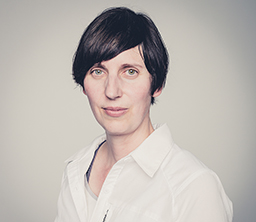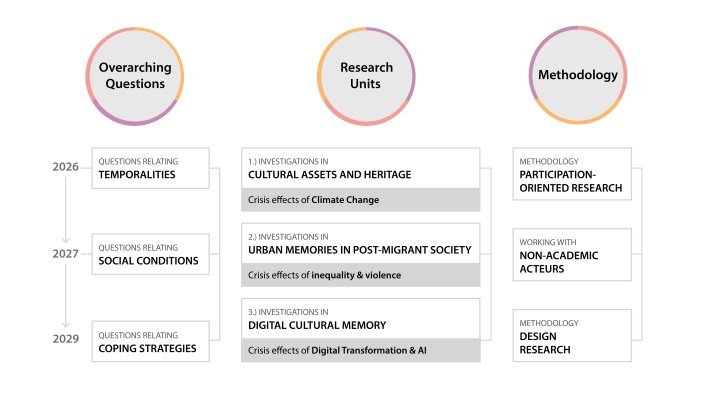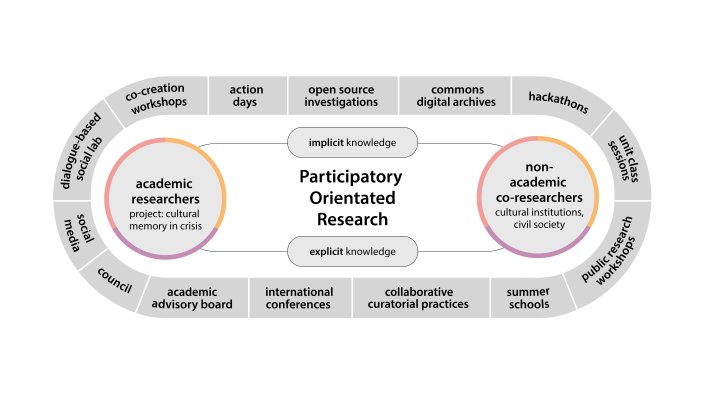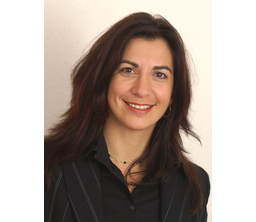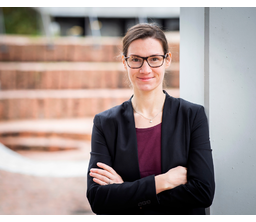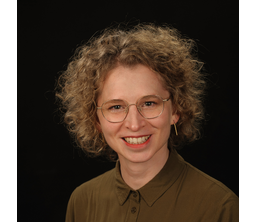Cultural Memory in Crisis
Starting in January 2026, TH Köln will establish a new collaborative research focus funded by the German Research Foundation (DFG) as part of its “Research Impulse” programme. The Research Impulse “Cultural Memory in Crisis” aims to explore cultural memory through innovative approaches, incorporating transdisciplinary crisis studies and participation-oriented research methods to advance the field of memory studies. To achieve the goals, the project will involve nine principal investigators (PIs) from the participating Faculties of Cultural Sciences, Architecture and Applied Social Sciences. Furthermore, the project will implement structured measures, including the establishment of a W2 professorship and the creation of six doctoral and three postdoctoral positions. This initiative will strengthen existing research frameworks at TH Köln, foster connections with cultural institutions in Cologne, and lay the groundwork for establishing a Centre for the Applied Study of Cultural Memory after DFG funding concludes in 2030.
“Cultural Memory in Crisis” will leverage the expertise of the involved faculties to address three key objectives: First, it will study the impact of crises on cultural memory using the analytical frameworks of crisis studies. Second, the initiative will analyse the interconnectedness of crises in relation to cultural memory, integrating insights from contemporary polycrisis research (Tooze 2022; Penner 2023; Lawrence, Homer-Dixon, Janzwood, Rockstöm, Renn and Donges 2024), it will introduce participation-oriented methodologies to memory studies enriched with techniques from design research. The project will tackle three overarching questions: It will examine the temporal dimensions of crises’ influence on cultural memory, including the origins of polycrisis within cultural memory. It will also investigate the societal contexts of crises in cultural memory, emphasising intersectionality. Finally, it will explore coping mechanisms and resilience strategies, focusing on cultural and social practices adopted by individuals and groups.
By combining traditional memory studies methods with participation-oriented approaches, the project seeks to empower non-academic participants to play an active role in shaping the research programme. These methodologies will be integrated with design research techniques that enable audiovisual communication between researchers and collaborators and allow the documentation and interpretation of implicit knowledge. The study will examine cultural memory under crisis in three main areas: First, it will assess climate crisis effects on cultural assets and heritage. Second, it will explore the impact of crises on memory in post-migrant society. Third, it will investigate how artificial intelligence influences digital memory culture.
The project follows Astrid Erll’s definition of “cultural memory” (Erinnerungskultur) as the “historically and culturally variable manifestations of collective memory” building on Maurice Halbwachs’ understanding of an mémoire collective that transcends the individual, is socially and culturally embedded, and has a certain permanence (Erll 2008, p. 176; Halbwachs 1925). As Rodney Harrison has put it, memory studies examine “the creation of a past in the present” (Harrison 2012, p. 38), emphasising the constructed nature of cultural memory. Our project combines studies on cultural memory with crisis research in new ways. Crisis researchers understand crises as non-determined situations – of varying length – that disturb, unsettle, threaten, discriminate and physically harm, yet may also open up options for action and call into question behaviours and routines. Crises are “non-indicated deviations from normality” and at the same time “intensifying decision-making phases with a basically open outcome” (Peters et al 2024, p. 10). Crises encompass political, ecological, technological or social events and circumstances. Crises can and should be understood both as “real” shock effects that impact societies but also a category of societal perception at the same time (Balint and Wortmann 2021).
Overarching Questions
The project will examine the significance of crisis for cultural memory in the Western world on the basis of three overarching questions, which, due to their complexity, require several years of investigation. They are to be dealt with in three consecutive project phases to ensure coherence. The overarching questions will be addressed in the project’s three research units: cultural assets and heritage, urban memories in post-migrant society and digital cultural memory. The principal investigators (PIs) will supervise these units in groups of three, thereby addressing the questions together with postdocs and doctoral candidates on the basis of specific fields of memory research and specific crisis contexts.
The first project phase (2026–27) will be dedicated to engaging in the current debate on the temporality of crises by adopting perspectives and approaches offered by crisis studies (Baumbach and Neumann 2023). Specifically, we will explore whether crises tend to occur as short, cumulative events or as liminal phases in formations of cultural memory, e.g. crises as moments when change is imminent but has not occurred. We are also interested in the extent to which crises either tend to become standard cases or remain exceptions to the norm in cultural memory. Another aspect of temporality is the limited availability of time in crisis situations. We will look how much an invocation of urgency prompts actors to act quickly, and we will investigate how this condition changes the ways society deals with cultural memory. In this context, entanglement-oriented polycrisis research will allow the project to delve into the beginnings of the polycrisis era for cultural memory. In order to understand the present of today’s age of crisis, historical temporal dimensions are taken into consideration.
In the second project phase (2027–28), we will bring together perspectives on the social conditions that frame crisis effects on cultural memory in innovative ways. Cultural memory is “an important issue in the struggle for power among social forces” (Le Goff 1992, p. 54). The effects of these struggles will be analysed not just on an institutional, structural and material level but also with regard to the individual dispositions of actors, communities and groups. Taking up considerations of crisis studies on intersectionality (Knepper, Evans and Henley 2023), we will ask to what extent crisis effects on cultural memory are reinforced by inclusion and exclusion categories, such as gender, race or class, and how much these categories contribute to the production of specific crisis perceptions. The post-colonial criticism of any assumed homogenous “Western crisis discourse” (Mergel 2011, p. 20) is another aspect of crisis studies that we will prioritise by accounting for the crisis effects on non-Western memory actors and groups in the Western world. Finally, the age of polycrisis is marked by the interdependency effects of crises; thus, we ask to what extent the effects of interconnections present themselves differently within various memory groups. We will test whether polycrisis indeed does occur in a socially differentiated mode in cultural memory that mirrors the multilayered power structures of society.
In the third project phase (2029–30), we will examine the coping practices and future visions designed by affected actor groups in order to further develop cultural memory in crisis. This will be accomplished by sifting through their strategies to produce resilience. This problem ties in with what is called reflexive crisis research (Bösch, Deitelhoff, Kroll and Thiel 2020), a branch of crisis studies that emphasizes the constructivist character of crises and possibilities for action that a given crisis opens up. Our aim will be to analyse which expectations actors associate with their action options and which practices they generate to cope with crisis. In particular, our research will address the strategies that memory activists – a central and novel concept in memory studies (Gutman and Wüstenberg 2023) – use against the hegemonic, often state-determined cultural memory and against other hegemonic practices of dealing with memory crisis. Polycrisis research is relevant in this regard, because it will allow us to address the significance of interdependencies between activist groups that are caused by mutual and interrelated crises. From this perspective, polycrisis research can be used to shed new light on specific social forms of appropriation and coping strategies to confront crisis in cultural memory.
Methods
In order to properly address all three overarching questions with a trifecta of research units, the project proposes a multi-modal approach that accounts for the diversity of memory studies methods. These include, inter alia, material and media analyses, object biographies, archival research, observations and fieldwork, oral histories, interviewing with a catalogue of questions. Using all of these methods is crucial for both empirical knowledge and situated knowledge to be included in the project. However, in order to address the fact that cultural memory structures power relations in society and that multiple crises effects are increasingly reshaping everyday life, the project will rely heavily on participation-oriented approaches, which represent a specific approach to the genesis of knowledge through mutually interrelated translation relationships between academic/practical knowledge (von Unger 2014; Selke 2015; Schillig, Knoll and Lingenhöle 2022). Participation-oriented approaches enable the life-world knowledge of co-researchers to be incorporated into the conception/further development of the project as well as the interpretation of data. Participation-oriented research maintains the basic attitude that values the knowledge and skills of non-academic actors, and as such it will allow us to dive into and indeed also innovatively change forms and practices of cultural memory in crisis in collaborative ways. Participatory exchange not only promotes societal community engagement with cultural memory; it also supports a collective assumption of responsibility and strengthens social acceptance of objects or groups representing collective memories.
Participatory design will help activate the implicit and explicit memory knowledge of non-academic actors and at the same time aid us in critical reflection about results of nonparticipatory memory studies (Ehn 2008; Mareis, Held and Joost 2013; Fezer and Schmitz 2019). The forms and spaces designed as part of the project will adopt existing practices of communication, interaction and social design, but systematically develop them further. These include dialogue-based social labs, co-creation workshops, action days, open source investigations, commons digital archives, collaborative curatorial projects, hackathons and social media. These forms and tools open up dynamic spaces and help us access past events and memories from the co-researcher’s perspective, and they boost visibility for (marginalised) co-researchers. The use of these tools also accounts for the fact that true partnership with co-researchers often only can be established after a certain period of time; a certain period of contact is needed for participation to flourish.
Research Unit I: Cultural Assets and Heritage
Research Unit I will be investigating the close relationship between cultural memory and the crisis effects of climate change with a particular focus on the preservation and production of cultural assets and heritage. Its objects of examination exist wherever environmental and sociopolitical crises overlap, e.g. in the potential of crisis as catalysts for the growing public perception of assets and heritage. Cultural assets and heritage are considered to be documents of memory whose material layers figure as records and responses to their changing environments. On the basis of case studies, the research unit will analyse the limits, possibilities and conflicts of heritage preservation. These also arise as results of emotional, social and societal shocks, which are crucial for the way the damaged objects are treated. In addition to reconstruction, conservation and restoration, the unit’s researchers will question historical narratives, politics of memory and ways of dealing with heritage in contemporary social contexts that are shaped by crises. The unit will be problematising the integrity of artefacts and the instrumentalisation of restoration and reconstruction to enforce political and economic interests. It will investigate how global and local climatic transformations alter which cultural assets and heritage can be considered worthy of preservation for the future.
PI Prof Dr Carolin Höfler explores built environments as living archives, examining the intricate interplay between climate crises and hegemonic structures. Her research particularly focuses on the role of media-based reconstruction methods in the production, documentation, and communication of memories relating to architecture and historical events. She also develops participatory and creative approaches to make marginalised spaces of memory and cultural practices visible. PI Prof Dr Tilly Laaser works on the impact of flood events on cultural memory, specifically in the preservation and analysis of movable cultural heritage that has been heavily marked by water and mud. She will focus on the aftermath of the flood event in the Rhenish Ahr Valley in 2021 to analyse the role of physical traces on works of art in memory processes and develop resilience strategies in collaboration with local actors. PI Prof Dr Daniel Lohmann examines architectural and urban heritage in view of crisis-induced change. He analyses current challenges and strategies of adapting and preserving architecture as cultural memory in climate and societal crises. His project examines different challenges of transformation, notably in regard to post-World-War II modernist houses and industrial urban heritage sites.
Research Unit II: Urban Memories in Post-Migrant Society
This research unit will examine how urban cultural memories are configurated in post-migrant society under crisis conditions. In the post-migrant urban space, cultural memory and institutions are conditioned by crisis-ridden structures and practices that tend to work against groups with migration history. Post-migrant societies on the whole are known to exercise physical violence and exclusionary behaviour toward the bodies, objects, places and institutions of people with migrant history, Black People and People of Colour (BPoC). They also are home to exclusionary, discriminatory discourses that symbolically separate these marginalised groups from the “majority society”. All of these are crisis effects that stem from ideologies of inequality, such as right-wing extremism and spaces, racism and anti-Semitism and the practices that emanate from them. Cities, however, are home to a particular crystallisation of spaces for migration and diverse groups. Yet, they also hold many places of social exclusion, for example in regard to infrastructures, municipal politics, resource management and their nature as interfaces of interactions between physical and digital artefacts. At the same time, cities are spaces of condensed cultural memory with a particularly high density of geographical or physical places of memory, buildings, streets or squares, not least for the marginalized memories of people with migration history. Researchers working with this unit adhere to a relational concept of urban space that encompasses social structure, the material world of objects and bodies, and the symbolic dimension of the social world.
PI Prof Dr Schahrzad Farrokhzad will investigate cultural memory in Germany’s post-migrant society by examining the national significance of migration history. She focuses on the production of individual and collective migration history narratives of different groups of actors in urban social spaces. PI Prof Sabine Tastel examines “invisible” places of urban cultural memory in post-migrant society – unrecognisable as such at first glance: railway stations, service stations, informal meeting places or workplaces. PI Prof Andreas Wrede focuses on the reconstruction and deconstruction of dominant societal memory cultures using the example of memory artifacts (e.g., street names, memorials, and architectural monuments) in Cologne. In this context, he also examines the possibilities and conditions of hybrid spaces for education and participation.
Research Unit III: Digital Cultural Memory
Research Unit III: Digital Cultural Memory will delve into the crisis impact of digital transformation on cultural memory by focusing on the rise of artificial intelligence (AI) systems, which rely on large datasets for automatic content generation. The research unit will look at AI from a new angle: as a standardisation crisis. AI’s nature seems to make it perfect for providing content that embodies political, economic and cultural preconceptions (Scherffig and Hawranke 2024). Generative AI, it can be argued, poses a standardisation crisis as it “learns” cultural norms from training data and reproduces these as “generated” content. In other words, GenAI reproduces what has already been standardised, thereby reinforcing the standardisation and repetition of stereotypical statements, images and artefacts. The data that large language models (LLMs) or AI chatbots, such as ChatGPT, use largely determines the answers they give to queries and thus indirectly reflects the respective socio-political positions of companies and political stakeholders. Thus, AI technologies are not merely passive transmitters of memory content; they actively shape memory practices, not least on a generation-specific basis. This has profound consequences for linguistic, media, cultural and architectural forms of cultural memory. The digitalisation of cultural memory gives rise to new (also non-human) actors, new time structures and new ideas of memory.
PI Prof Marco Hemmerling will work on the effects and potential of AI for the creation of architectural cultural memory through the BIM method and its ability to semantically enrich memory objects in terms of material, cultural and social meanings. PI Prof Dr Lasse Scherffig will continue to investigate generative AI as a crisis of cultural memory by analysing historical (dis-)continuities in the digitisation of archives. His project interventions will attempt to counter stereotypes/standardisation tendencies of generative AI and the mechanisms of inclusion and exclusion in AI systems’ design. PI Prof Dr Friederike Siller analyses how memory practices and cultures among adolescents and young adults are formed by social media and generative AI; in so doing, she will delve deeper into the interplay of platform and data logics as well as the interaction and construction processes of the users.
Transfer Activities
Our understanding of knowledge transfer stresses civil society as co-producer of knowledge and co-creator of its own learning environment, with a responsibility of academia to allow itself be shaped by the public. Conversely, the project recognises the role of universities as coproducers of a pluralistic and democratic society, with a responsibility to engage with the public to find its own shape. PIs Prof Carolin Höfler and Prof Sabine Tastel will coordinate in this engagement as our Coordinators for Transfer and Communication. Following the project’s participation-orientated method and the ideals put forth in TH Köln’s Transfer Strategy 2025: Making Knowledge Socially Effective, our transfer partners will become participatory co-researchers. Our transfer partners will include committed cultural memory actors and institutions, such as museums, themed libraries and documentation centres, as well as multidisciplinary platforms and exhibition venues for contemporary arts. Civil society initiatives will also be partnering with us.
We plan to culminate our knowledge transfer in a large co-curated exhibition in Cologne in June 2030, spreading and further creating knowledge on cultural memory outside the established spaces and formats of academic practice. The curatorial project will make use of artistic spaces for reflection in particular as these allow for the creation of forms of knowledge and practice that differ from academic research. A special focus of the curatorial project will lie in the connection between post-coloniality and cultural memory in crisis – an aspect relevant among the project’s research units already but given overarching and systematic attention in the curatorial project. The curatorial project will synthesise and push the previous results of the three research units by reflecting on the interests and areas of activity of the partner institutions. Events such as roundtables, workshops, lecture performances and film screenings are planned to accompany and frame the curatorial project. It seeks to create formats for a group-specific cultural and educational programme. These include audio-walks, interactive exhibitions, computer games or pop-up labs. Combining these formats, we will construct and apply new innovative hybrid mediation forms for knowledge transfer with the museums, documentation centres and other partners.
ECR Programme
The project will innovatively combine its research objectives with training for Early Career Researchers (ECRs) at all qualification levels, from master’s students to postdoctoral researchers. ECRs will make a decisive contribution to the project’s research. Prof Dr Daniel Lohmann, will act as the ECR Coordinator to ensure that TH Köln’s ECR-support measures are indeed tailored to the needs of the project. He will further act as a mediator between ECRs and PIs and successively monitor and develop the project’s support measures. The project will build on the existing measures at TH Köln to promote ECRs, notably the PLan_CV Programme and the Graduate Centre.
The project will target research-orientated master’s students who wish to prepare for a subsequent doctorate already. For this purpose, Research Master Studies will be established for highly motivated students from the participating faculties. As students of participating master’s degree courses at the participating faculties, they will receive excellent complementary training in this programme. Furthermore, the project will be geared toward training doctoral candidates, as well, notably at partnering universities both in Germany and abroad that are authorised to award doctorates. In the project, doctoral candidates will pursue an individual research project and gain key qualifications in academic event organisation, further developing their skills in transdisciplinary research and enabling them to establish their own (international) research network. The project will also encourage postdoctoral researchers to further develop their academic profile and acquire necessary academic qualifications for leadership positions, by offering the German postdoctoral qualification of habilitation in cooperation with institutions authorised to award habilitations. The project’s various formats and activities will allow postdocs to independently then develop their own projects with internationally recognised experts. At the same time, postdocs will be gaining important experience in scientific project management, teaching experience and academic leadership tasks.
Principal Investigators
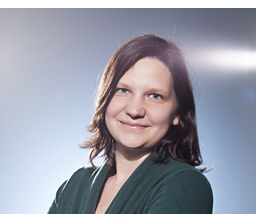
Prof. Dr. Friederike Siller
- Raum 123
+49 221-8275-3018
friederike.siller@th-koeln.de
Literature
Aldrich, R. (2011) Vestiges of Colonial Empire in France: Monuments, Museums and Colonial Memories, London: Palgrave Macmillan.
Anonymous (2001) SFB 434 „Erinnerungskulturen“: Programm, Historical Social Research / Historische Sozialforschung 26: pp. 267-271.
Apaydin, V. (2020) (ed). Critical Perspectives on Cultural Memory and Heritage Construction, Transformation and Destruction, London: UCL Press. DOI: https://doi.org/10.14324/111.9781787354845.
Assmann, A. (2021) Das neue Unbehagen an der Erinnerungskultur: Eine Intervention, 4th edition, Munich: C.H. Beck. DOI: doi.org/10.17104/9783406748967.
Balint, I. and Wortmann, T. (2021) (eds). Krisen erzählen, Paderborn: Brill | Fink. DOI: https://doi.org/10.30965/9783846764114.
Baumbach, S. and Neumann, B. (2023) Whose Temporalities? Which Crises? Temporalities in and of Crises in Anglophone Literatures, in S. Baumbach and B. Neumann (eds). Temporalities in/of Crises in Anglophone Literatures, New York: Routledge, pp. 1-24. DOI: https://doi.org/10.4324/9781003348122.
Bender, E. M., Gebru, T., McMillan-Major, A., and Shmitchell, S. (2021) On the Dangers of Stochastic Parrots: Can Language Models Be Too Big?, FAccT '21: 2021 ACM Conference on Fairness, Accountability, and Transparency. DOI: 10.1145/3442188.3445922. Open Access.
Benton, T. (2010) (ed). Understanding Heritage and Memory, Manchester: Manchester University Press.
Bianchi, F., Kalluri, P., Durmus, E., Ladhak, F., Cheng, M., Nozza, D. et al (2023) Easily Accessible Text-to-Image Generation Amplifies Demographic Stereotypes at Large Scale, in FAccT '23: the 2023 ACM Conference on Fairness, Accountability, and Transparency, pp. 1493-1504. DOI: https://doi.org/10.1145/3593013.3594095. Open Access.
Bösch, F., Deitelhoff, N., Kroll, S., and Thiel, T. (2020) Für eine reflexive Krisenforschung – zur Einführung, in F. Bösch, N. Deitelhoff, and S. Kroll (eds). Handbuch Krisenforschung, Wiesbaden: Springer, pp. 3-16. DOI: https://doi.org/10.1007/978-3-658-28571-5.
Bozay, K., Güner, S., Mangitay, O., and Göcer, F. (2020) (eds). Damit wir atmen können. Migrantische Stimmen zu Rassismus, rassistischer Gewalt und Gegenwehr, Cologne: PapyRossa.
Buchinger, K., Gantet, C., and Vogel, J. (eds). Europäische Erinnerungsräume, Frankfurt Main: Campus 2009.
Bukow, W.-D. (2010) Urbanes Zusammenleben. Zum Umgang mit Migration und Mobilität in europäischen Stadtgesellschaften, Wiesbaden: Springer.
Burckhardt, L. (2006) Warum ist Landschaft schön? Die Spaziergangswissenschaft, edited by Markus Ritter and Martin Schmitz, Berlin: Martin Schmitz.
Bush, V. (1945) As We May Think, Atlantic Monthly 176: pp. 101-108.
Ciatti, M. (2017) The Flood and the Conservation of Works of Art: From Disaster to New Opportunities, in International Conference Florence 1966-2016: Resilience of Art Cities to Natural Catastrophes: The Role of Academies: (Roma, 11-13 October 2016), pp. 85-117.
Cramer, R., Schmidt, J., and Thiemann, J. (2023) (eds). Postmigrant Turn. Postmigration als kulturwissenschaftliche Analysekategorie, Berlin: Neofelis.
Craps, S., Crownshaw, R., Wenzel, J., Kennedy, R., Colebrook, C., and Nardizzi, V. (2018) Memory studies and the Anthropocene: A roundtable, Memory Studies 11: pp. 498-515. DOI: https://doi.org/10.1177/1750698017731068.
Creet, J. and Kritzmann, A. (2010) Memory and migration: Multidisciplinary approaches to memory studies, in J. Creet and A. Kritzmann (eds). Memory and Migration, Toronto: University of Toronto Press, pp. 3-26.
Csáky, M. (2010) Das Gedächtnis der Städte. Kulturelle Verflechtungen – Wien und die urbanen Milieus in Zentraleuropa, Vienna: Böhlau.
Czollek, M. (2023) Versöhnungstheater, Munich: Carl Hanser.
De Cesari, C. and Rigney, A. (2014) Transnational Memory: Circulation, Articulation, Scales, Berlin, Munich and, Boston: De Gruyter. DOI: https://doi.org/10.1515/9783110359107.
Dellemann, C. et al (2002) BURANO – Eine Stadtbeobachtungsmethode zur Beurteilung der Lebensqualität, in M. Riege and H. Schubert (eds). Sozialraumanalyse, Wiesbaden: VS Verlag für Sozialwissenschaften, pp. 85-101. DOI: https://doi.org/10.1007/978-3-322-94995-0_4.
Distelmeyer, J., Ehrmanntraut, S., and Müller, B. (eds). Algorithmen & Zeichen. Beiträge von Frieder Nake zur Gegenwart des Computers. Berlin: Kulturverlag Kadmos. DOI: https://doi.org/10.25969/mediarep/19385.
Dogramaci, B. (2017) Migration findet Stadt(museum) – Repräsentationen von Einwanderungsgeschichte, IMIS-Beiträge 51: pp. 19-38.
Ehn, P. (2008) Participation in Design Things, in Proceedings Participatory Design Conference 2008, ACM Digital Library, pp. 92-101, http://www.diva-portal.org/smash/get/diva2:1408103/FULLTEXT01.pdf, accessed by 25 January 2025. Open Access.
Erll, A. (2008) Kollektives Gedächtnis und Erinnerungskulturen, in A. Nünning and V. Nünning (eds). Einführung in die Kulturwissenschaften. Theoretische Grundlagen – Ansätze – Perspektiven, Stuttgart and Weimar: J.B. Metzler, pp. 156-185. DOI: https://doi.org/10.1007/978-3-476-05057-1_8.
Erll, A. and Olick, J. K. (2021) Memory Studies and the Future of Memory: A Conversation between Astrid Erll and Jeffrey K. Olick, in C. Wiese, S. Vogt, D. Kiesel, and G. Schneider-Ludorff (eds). Die Zukunft der Erinnerung: Perspektiven des Gedenkens an die Verbrechen des Nationalsozialismus und die Shoah, Berlin and Boston: De Gruyter, pp. 253-268. DOI: https://doi.org/10.1515/9783110710601-015.
Esposito, E. (2017) Algorithmic memory and the right to be forgotten on the web, Big Data & Society 4. DOI: https://doi.org/10.1177/2053951717703996.
Farrokhzad, S. and Zufacher, M. (2022) Empowerment – konzeptionelle Suchbewegungen und praktische Anknüpfungspunkte für eine diversitätssensible Familienbildung in der Migrationsgesellschaft, in U. Müller-Giebeler and M. Zufacher (eds). Familienbildung – Praxisbezogene, empirische und theoretische Perspektiven, Weinheim: Beltz Juventa, pp. 155-182.
Farrokhzad, S. et al (2024) Extrem rechte und rassistische Gewalt. Auswirkungen – Handlungs- und Bewältigungsmuster – Konsequenzen, Weinheim, Basel: Beltz, https://www.pedocs.de/volltexte/2024/29822/pdf/Farrokhzad_Jagusch_2024_Extrem_rechte_und_rassistische_Gewalt.pdf, accessed by 25 January 2025. Open Access.
Farrokhzad, S., Kunz, T., Mohammed Oulad M´Hand, S., and Ottersbach, M. (2021) (eds). Migrations- und Fluchtdiskurse im Zeichen des erstarkenden Rechtspopulismus, Wiesbaden: Springer. DOI: https://doi.org/10.1007/978-3-658-32498-8.
Farrokhzad, S., Scherschel, K., and Schmitt, M. (2022) (eds). Geflüchtete Frauen. Analysen – Lebenssituationen – Angebotsstrukturen, Wiesbaden: Springer. DOI: https://doi.org/10.1007/978-3-658-35038-3.
Fezer, J. and Schmitz, M. (2019) (eds). Lucius Burckhardt: Who Plans the Planning? Architecture, Politics, and Mankind, Basel: Birkhäuser.
Foroutan, N. (2021) Die postmigrantische Gesellschaft. Ein Versprechen der pluralen Demokratie. 2th edition, Bielefeld: Transcript. DOI: 10.14361/9783839459447.
Fridman, O. and Gensburger, S. (2024) (eds). The COVID-19 Pandemic and Memory: Remembrance, commemoration, and archiving in crisis, Cham: Springer. DOI: 10.1007/978-3-031-34597-5.
Georgi, V. B., Lücke, M., Meyer-Hamme, J. and Spielhaus, R. (2022) (eds). Geschichten im Wandel. Neue Perspektiven für die Erinnerungskultur in der Migrationsgesellschaft, Bielefeld: Transcript. DOI: https://doi.org/10.1515/9783839457924. Open Access.
Gleiter, J. (2024) Für einen lebendigen Begriff – Sieben Thesen zur Ästhetik der Nachhaltigkeit, Die Architekt 4: pp. 18-22.
Grund, M. and Scherffig, L. (2024) Approaching the Aesthetics and Materiality of Hidden Layers, rrrreflect. Journal of Integrated Design Research 1. DOI: https://doi.org/10.57684/COS-1265. Open Access.
Gutman, Y. and Wüstenberg, J. (2023) (eds). The Routledge handbook of memory activism, London: Routledge. DOI: 10.4324/9781003127550.
Halbwachs, M. (1925) Les cadres sociaux de la mémoire, Paris: Alcan.
Hanke, K. and Siller, F. (2021) (eds). Teilhaben! Kinderrechtliche Potenziale der Digitalisierung, https://www.dossier.kinderrechte.de, accessed by 2 March 2024. Open Access.
Harrison, R. (2012) Heritage. Critical Approaches, London: Routledge.
Hein-Kircher, H. (2020) Krisen in der Erinnerung – Erinnerung in Krisen: Die Bedeutung politischer Mythen für das Geschichtsbewusstsein und zur Krisenbewältigung, in F. Bösch, N. Deitelhoff, and S. Kroll (eds). Handbuch Krisenforschung, Wiesbaden: Springer, pp. 93-108. DOI: https://doi.org/10.1007/978-3-658-28571-5.
Hemmerling, M. and Bähre, B. (2020) Informierte Architektur: Building Information Modelling für die Architekturpraxis, Berlin: Birkhäuser. DOI: https://doi.org/10.1515/9783035619133.
Hemmerling, M. and Salzberger, M. (2023) :metabolon – A prototypical approach towards sustainable housing, in W. Dokonal, U. Hirschberg, and G. Wurzer (eds). Digital Design Reconsidered – Proceedings of the 41st Conference on Education and Research in Computer Aided Architectural Design in Europe – Volume 1, 20-22 September 2023, Graz, pp. 333-338. DOI: https://doi.org/10.52842/conf.ecaade.2023.1.333. Open Access.
Henig, D. and Knight, D. M. (2023) Polycrisis: Prompts for an emerging worldview, Anthropology Today 39: pp. 3-6. DOI: https://doi.org/10.1111/1467-8322.12793.
Heuchemer, S., Siller, F., and van Treeck, T. (2018) (eds). Profilbildung und Wertefragen in der Hochschulentwicklung – Hochschuldidaktik forscht zu Vielfalt und Offenheit, Cologne: Cologne Open Science, https://d-nb.info/1174587466/34, accessed by 2 March 2024. Open Access.
Hnilica, S. (2012) Gedächtnis Stadt – Eine schwierige Metapher, in Fakultät für Architektur und Raumplanung (ed). Stadt: Gestalten. Eine Festschrift für Klaus Semsroth, Vienna: Springer, pp. 10-15.
Höfler, C. (2021a) „The Imaginary Gaze of a Future Archaeologist“: Medienarchitekturen des Dokumentarischen, Navigationen: Zeitschrift für Medien und Kulturwissenschaften 21, pp. 89-112. DOI: 10.25969/mediarep/17190. Open Access.
Höfler, C. (2023) Vom Wolkenkratzer zur Wolke: Die kalkulierten Atmosphären der Cloud-Architekturen, in M. Tamborini (ed). Die Ästhetik der Technowissenschaften des 21. Jahrhunderts. Darmstadt: wbg Academic, pp. 201-228.
Höfler, C. (2024d) Materielle Zeugen, digitale Muster: Überzeugungsarbeit in der Architektur der Gegenwart, in J. Harst (ed). Virtuelle Investigationen. Revisionen des Indizienparadigmas in Literatur und Kunst, Cologne: USB monographs, pp. 211-238, https://monographs.ub.uni-koeln.de/usbk/catalog/view/35/56/270, accessed by 25 January 2025. Open Access.
Höfler, C. (2024b) Material Acts: Modeling between ‘Knowing-less’ and ‘Knowing-more’, in C. Höfler and M. Karch (eds). Recalls, Reconstructions, Projections: Time-Based Design Processes in Architecture. Munich: Sorry Press 2024, pp. 116-121.
Höfler, C. (2024c) Time Capsules: Actualizing Collective Memories, in Dimensions: Journal of Architectural Knowledge 7: pp. 21-38, https://www.transcript-publishing.com/media/pdf/96/6a/2d/oa97838394686541nIgMWGOAJTkL.pdf, accessed by 3 February 2025. Open Access.
Höfler, C. and Karch, M. (2024a) (eds). Recalls, Reconstructions, Projections: Time-Based Design Processes in Architecture. Munich: Sorry Press.
Höfler, C. and Mehl, J. (2023) (eds). Attending [to] Futures: Matters of Politics in Design Education, Research, Practice, Hamburg: adocs, https://adocs.de/de/system/files/ebooks/9783943253726_high.pdf, accessed by 11 March 2024. Open Access.
Höfler, C. and Reinfeld, P. (2022) (eds). Mit weit geschlossenen Augen. Virtuelle Realitäten entwerfen. Paderborn: Brill | Fink.
Höfler, Carolin (2021b) Taktische Hüllen: Zur Allgegenwart und Unsichtbarkeit von Sicherheitsarchitekturen, Arch+. Zeitschrift für Architektur und Urbanismus 245, pp. 140-147.
Hönig, S. and Špikić, M. (2024) (eds). Erschütterung. Erde und Erbe in der Krise, Heidelberg: arthistoricum.net. DOI: https://doi.org/10.11588/arthistoricum.1472. Open Access.
Horsley, N. (2020) Intellectual autonomy after artificial intelligence: The future of memory institutions and historical research, in N. Lushetich (ed). Big Data – A New Medium?, London: Routledge, pp. 131-144. DOI: https://doi.org/10.4324/9780429319556.
Hoskins, A. (2018) The restless past: An introduction to digital memory and media, in A. Hoskins (ed). Digital Memory Studies: Media Pasts in Transition, New York: Routledge, pp. 1-18.
Hoskins, A. and Halstead, H. (2021). The new grey of memory: Andrew Hoskins in conversation with Huw Halstead. Memory Studies 14: pp. 675-685. DOI: https://doi.org/10.1177/17506980211010936.
Jenkins, H., Ito, M., and Boyd, D. (2016) Participatory Culture in a Networked Era: A Conversation on Youth, Learning, Commerce, and Politics, Cambridge: Polity Press 2016.
Johnson, N. (1995) Cast in stone: Monuments, Geography and Nationalism, Environment and Planning D: Society and Space 13: pp. 51-65.
Jones-Imhotep, E. (2020) The ghost factories: Histories of automata and artificial life, History and Technology 36: pp. 3-29. DOI: https://doi.org/10.1080/07341512.2020.1757972.
Kansteiner, W. (2019) Migration, racism, and memory, Memory Studies 12: pp. 611-616. DOI: https://doi.org/10.1177/1750698019886712.
Kansteiner, W. (2022) Digital Doping for Historians: Can history, memory and historical theory be rendered artificially intelligent?, History and Theory 61: pp. 119-133. DOI: https://doi.org/10.1111/hith.12282.
Kilian, J., Neugebauer, A., Scherffig, L., and Wahl, S. (2022) The Unfolding Space Glove: A Wearable Spatio-Visual to Haptic Sensory Substitution Device for Blind People, Sensors 22: pp. 18-59. DOI: https://doi.org/10.3390/s22051859.
Knepper, H.J., Evans, M.D., and Henley, T.J. (2023) (eds). Intersectionality and crisis management: a path to social equity, New York and London: Routledge.
Kutscher, N., Ley, T., Seelmeyer, U., Siller, F., Tillmann, A., and Zorn, I. (2020) (eds). Handbuch Soziale Arbeit und Digitalisierung, Weinheim: Beltz Juventa, https://content-select.com/de/portal/media/download_oa/9783779952589, accessed by 2 March 2024. Open Access.
Kwet, M. (2019) Digital colonialism: US empire and the new imperialism in the Global South, Race & Class 60: pp. 3-26. DOI: https://doi.org/10.1177/0306396818823172.
Laaser, T. (2024) Conservation as an academic discipline in dialogue with Art History and the Sciences – a German perspective, in C. Betelu (ed). Recherches de conservateurs(rices)-restaurateurs(rices), Florilège (2018-2022), Paris: HiCSA Éditions, pp. 122-127, https://hicsa.pantheonsorbonne.fr/sites/default/files/2024-01/livre_betelu.pdf, accessed by 6 March 2024. Open Access.
Laaser, T. and Wernz-Kaiser, H. (2023) Konstruktiv an die Flut erinnern, Paper presented at the symposium Mit der Öffentlichkeit erinnern: Für eine kooperative Kulturwissenschaft, Faculty of Cultural Sciences, TH Köln, 8 November.
Lambert, A., Nansen, B., and Arnold, M. (2018) Algorithmic memorial videos: Contextualising automated curation, Memory Studies 11: pp. 156-171.
Lawrence, M., Homer-Dixon, T., Janzwood, S., Rockstöm, J., Renn, O., and Donges, J. F. (2024) Global polycrisis: The causal mechanisms of crisis entanglement, Global Sustainability 7: pp. 1-16. DOI: 10.1017/sus.2024.1.
Le Goff, J. (1992) History and memory, New York: Columbia University Press.
Levy, D. and Sznaider, N. (2006) The Holocaust and Memory in the Global Age, Philadelphia: Temple University Press.
Li, M. (2024) Disaster Risk Management of Cultural Heritage: A Global Scale Analysis of Characteristics, Multiple Hazards, Lessons Learned from Historical Disasters, and Issues in Current DRR Measures in World Heritage Sites, International Journal of Disaster Risk Reduction 110. DOI: https://doi.org/10.1016/j.ijdrr.2024.104633.
Lipp, W. (2023) Corona – Klima – Krieg. Denkmalpflege im Folgensog der Katastrophen, Horn and Wien: Verlag Berger.
Lohmann, D. (2024) Besonders erhaltenswerte Bausubstanz und Gebäudeenergie – das Forschungsprojekt erBe2045, Mitteilungen aus dem LVR-Amt für Denkmalpflege im Rheinland 43: pp. 71-78.
Lohmann, D., Hanenberg, N. and Raabe, C. (2017) (eds). The Heritage of Mies, Special Issue docomomo journal 56.
Lohmeier, C. and Pentzold, C. (2023) Communicating memory matters: Introduction to the collection, Memory, Mind & Media 2. DOI: 10.1017/mem.2023.11.
Lorenz, M. N., Thomas, T., and Virchow, F. (2022) (eds). Rechte Gewalt erzählen: Doing Memory in Literatur, Theater und Film, Berlin und Heidelberg: J.B. Metzler.
Löw, Martina (2016) The Sociology of Space: Materiality, Social Structures, and Action, London: Palgrave Macmillan.
MacDonald, S. (2013) Memorylands: Heritage and Identity in Europe Today, New York: Routledge.
Mandolessi, S. (2024) Memory in the digital age. Open Res Eur 12. DOI: 10.12688/openreseurope.16228.1.
Mareis, C., Held, M., and Joost, G. (2013) (eds). Wer gestaltet die Gestaltung? Praxis, Theorie und Geschichte des partizipatorischen Designs, Bielefeld: Transcript.
McFarlane, A. (2020) AI and Cyberpunk Networks, in S. Cave, K. Dihal, and S. Dillon (eds). AI Narratives: A History of Imaginative Thinking about Intelligent Machines, Oxford: Oxford Academic. DOI: https://doi.org/10.1093/oso/9780198846666.003.0013.
Mergel, T. (2011) Einleitung: Krisen als Wahrnehmungsphänomene, in T. Mergel (ed). Krisen verstehen. Historische und kulturwissenschaftliche Annäherungen, Frankfurt Main: Campus, pp. 9-22.
Merrill, S. (2023) Artificial intelligence and social memory: Towards the cyborgian remembrance of an advancing mnemo-technic, in S. Lindgren (ed). Handbook of critical studies of artificial intelligence, Cheltenham: Edward Elgar, pp. 173-186. DOI: https://doi.org/10.4337/9781803928562.00020.
Messerschmidt, A. (2008) Postkoloniale Erinnerungsprozesse in einer postnationalsozialistischen Gesellschaft – vom Umgang mit Rassismus und Antisemitismus, Peripherie 28: pp. 42-60.
Meyer, C., Patzel-Mattern, K., and Schenk, G. J. (2012) (eds). Krisengeschichte(n). „Krise“ als Leitbegriff und Erzählmuster in kulturwissenschaftlicher Perspektive, Stuttgart: Franz Steiner.
Meyer, R. (2023) The New Value of the Archive. AI Image Generation and the Visual Economy of ‘Style’, IMAGE. Zeitschrift für interdisziplinäre Bildwissenschaft 37: pp. 100-111. DOI: 10.1453/1614-0885-1-2023-15458.
Miessen, M. (2011) The Nightmare of Participation (Crossbench Praxis as a Mode of Criticality), London: Sternberg Press.
Motte, J. and Ohliger, R. (2004) (eds). Geschichte und Gedächtnis in der Einwanderungsgesellschaft. Migration zwischen historischer Rekonstruktion und Erinnerungspolitik. Essen: Klartext.
Nitzke, S. (2021) Krise und Erzählung. Geschichte(n), Bewältigungsstrategien und Feindbilder, Journal für politische Bildung 11: pp. 10-13. DOI: https://doi.org/10.46499/1669.1803.
Noble, S. U. (2018) Algorithms of oppression. How search engines reinforce racism, New York: New York University Press. DOI: https://doi.org/10.1177/1461444819876115.
Nora, P. (1989) Between Memory and History: Les Lieux de mémoire, Representations 26: 7-25.
Offert, F. (2023) On the Concept of History (in Foundation Models), IMAGE Zeitschrift für interdisziplinäre Bildwissenschaft 37: pp. 121-134. DOI: https://doi.org/10.1453/1614-0885-1-2023-15462.
Olick, J. K. and Teichler, H. (2021) Memory and Crisis: An Introduction, Memory Studies 14: pp. 1135-1142. DOI: https://doi.org/10.1177/17506980211063665.
Oswalt, P. (2023) Bauen am nationalen Haus: Architektur als Identitätspolitik, Berlin: Berenberg Verlag. DOI: https://doi.org/10.1515/9783839459294-01. Open Access.
Penner, M. (2023) The Paradox of Polycrisis: Capitalism, History, and the Present, Journal of History 58: pp. 152-166. DOI: https://doi.org/10.3138/jh-2022-0022.
Peters, S., Kny, J., and Scheffel, F. (2024) Die Metakrise. Wie die Zivilgesellschaft zur gesellschaftlichen Resilienz beiträgt, https://wechange.de, accessed by 25 January 2025. Open Access.
Pöppinghege, R. (2007) Wege des Erinnerns. Was Straßennamen über das deutsche Geschichtsbewusstsein aussagen, Münster: Agenda.
Rees, J. et al (2023) MEMO Multidimensionaler Erinnerungsmonitor 2023, Jugendstudie,
Institut für interdisziplinäre Konflikt- und Gewaltforschung (IKG) / Forschungsinstitut Gesellschaftlicher Zusammenhalt (FGZ), https://www.stiftung-evz.de/was-wir-foerdern/handlungsfelder-cluster/bilden-fuer-lebendiges-erinnern/memo-jugendstudie/, accessed by 25 January 2025. Open Access.
Rettich, S. and Tastel, S. (2020) (eds). Die Bodenfrage – Klima, Ökonomie, Gemeinwohl, Berlin: Jovis.
Rettich, S. and Tastel, S. (2023) (eds). Die zirkuläre Stadt. Theorie und Empirie urbaner Obsoleszensen, Berlin: Jovis.
Rosenthal, G. (2002) Biographisch-narrative Gesprächsführung: zu den Bedingungen heilsamen Erzählens im Forschungs- und Beratungskontext, Psychotherapie und Sozialwissenschaft 4: pp. 204-227, https://www.ssoar.info/ssoar/handle/document/5676, accessed by 25 January 2025. Open Access.
Rothberg, M. (2009) Multidirectional memory: Remembering the Holocaust in the age of decolonization, Stanford: Stanford University Press.
Sabrow, M. (2019) Von der Aufklärung zur Affirmation? Die Krise der Erinnerungskultur, S.I.M.O.N. Shoah: Intervention. Methods. Documentation 6: pp. 162-170.
Salvaggio, E. (2022) How to Read an AI Image. The Datafication of a Kiss. Cybernetic Forests, https://cyberneticforests.substack.com/p/how-to-read-an-ai-image, accessed by 25 January 2025. Open Access.
Saunders, D. (2011) Arrival city. How the largest migration in history is reshaping our world, London: Windmill.
Savoy, B. and Sarr, F. (2019) Zurückgeben. Über die Restitution afrikanischer Kulturgüter, Berlin: Matthes & Seitz.
Schaefer, I. and Narimani, P. (2021) Ethische Aspekte in der partizipativen Forschung – Reflexion von Herausforderungen und möglichen Beeinträchtigungen für Teilnehmende, Bundesgesundheitsblatt 64, pp. 171-178. DOI: https://doi.org/10.1007/s00103-020-03270-0.
Schecke, N. et al (2021) Die Verstetigung von urbanen Reallaboren im Spannungsfeld theoretischer Konzeption und praktischer Umsetzung – eine empirische Untersuchung, Rur.oekom.de; https://www.econstor.eu/bitstream/10419/240612/1/1769581642.pdf, accessed by 25 January 2025. Open Access.
Scherffig, L. and Hawranke, T. (2024) Hund. Gassi gehen im Latent Space, in I. Bolinski, T. Hawranke, and S. Rieger (eds). Virtuelle Tiere. Lebewesen zwischen Code und Kreatur, Bielefeld: Transcript, pp. 101-126. DOI: https://doi.org/10.1515/9783839471944. Open Access.
Scherffig, L., Muxel, A., Faubel, C., and Popplow, L. (2021) Training to Deal with Otherness – Rehearsing & Maintaining Human-Machine Relations, Proceedings of Politics of the Machines – Rogue Research, 14-17 September 2021: pp. 359-364. DOI: http://dx.doi.org/10.14236/ewic/POM2021.48. Open Access.
Schillig, A., Knoll, G., and Lingenhöle, S. (2022), Erinnerung partizipativ gestalten. Zivilgesellschaftliche Teilhabe an der Gestaltung öffentlicher Erinnerungskultur in der Schweiz. Bericht im Auftrag der Schweizerischen Akademie der Geistes- und Sozialwissenschaften, in: Swiss Academies Reports 17: pp. 1-48.
Schmal, P. C. et al (2016) (eds). Making Heimat. Germany, Arrival Country, Ostfildern: Hatje Cantz.
Schuh, J. (2024) AI As Artificial Memory: A Global Reconfiguration of Our Collective Memory Practices?, Memory Studies Review 1: pp. 1-25. DOI: 10.1163/29498902-202400012.
Schwarz, O. (2014) The past next door: Neighbourly relations with digital memory-artefacts. Memory Studies 7: pp. 7-21. DOI: https://doi.org/10.1177/1750698013490591.
Selke, S. (2015) Öffentliche Soziologie als Komplizenschaft. Vom disziplinären Bunker zum dialogischen Gesellschaftslabor, Zeitschrift für Theoretische Soziologie 1: pp. 179-207.
Shah, C. and Bender, E. M. (2024) Envisioning Information Access Systems: What Makes for Good Tools and a Healthy Web?, ACM Trans. Web 18: pp. 1-24. DOI: 10.1145/3649468.
Shur-Ofry, M, and Pessach, G. (2020) Robotic collective memory, Washington University Law Review 97: pp. 975-1005. DOI: 10.2139/ssrn.3364008.
Siller, F. (2020) Der digitale Kompass: Kinder und Algorithmen in Onlinemedien, in F. von Gross and R. Röllecke (eds). Familienkultur smart und digital: Ergebnisse, Konzepte und Strategien der Medienpädagogik, Munich: kopaed, pp. 31-38.
Siller, F. (2020) Online-Medien für Kinder und ihre Bedeutung für die gesellschaftliche Teilhabe, BPJMAKTUELL 3: pp. 4-10, https://www.bzkj.de/resource/blob/160144/be54ad479954f3d6ad6bf789e891d504/20203-online-medien-fuer-kinder-und-ihre-bedeutung-data.pdf, accessed by 2 March 2024. Open Access.
Siller, F., Hildebrandt, A., Roloff, P., and Schubert, M. (2024) Co-Constructing KI–CoCoKI, Entwicklungslabor für einen geschützten Kommunikationsraum für Kinder, Working Paper. DOI: https://doi.org/10.57683/EPUB-2751.
Frangen, V., Siller, F., and Tillmann, A. (2024) (eds). Wege von Einrichtungen der Jugendsozialarbeit in die Digitalisierung: Ideen – Konzepte – Methoden – Ermutigungen, https://jugendsozialarbeit.news/wp-content/uploads/2022/05/Wege-von-Einrichtungen-der-Jugendsozialarbeit-in-die-Digitalisierung-komprimiert.pdf, accessed by 28 January 2025. Open Access.
Sinders, C. (2017) Feminist Dataset, https://carolinesinders.com/feminist-data-set/, accessed by 5 January 2025. Open Access.
Sluis, K. (2010) Algorithmic memory? Machinic vision and database culture, in: A. Mousoutzanis and D. Riha (eds). New media and the politics of online communities, Boston: Brill, pp. 227-235. DOI: https://doi.org/10.1163/9781848880320_026.
Steg, J. (2020) Was heißt eigentlich Krise?, Soziologie 49: pp. 423-435.
Steyerl, H. (2023) Mean Images, New Left Review 140-41, https://newleftreview.org/issues/ii140/articles/hito-steyerl-mean-images, accessed by 5 January 2025. Open Access.
stolzeaugen.books UG (2022) (ed). Texte nach Hanau: Sammelband mit einem Vorwort von Serpil Temiz-Unvar, 2th edition, Cologne: stolzeaugen.books.
Szope, D. and Weibel, P. (2004) Die algorithmische Revolution. Ausstellungsbroschüre, Karlsruhe: ZKM.
Taylor, A. (2018) The Automation Charade, Logic Magazine 5: pp. 149-164.
Tooze, A. (2022) Welcome to the world of the polycrisis, Financial Times, 28 October.
Tošić, J. and Palmberger, M., Introduction: Memories on the Move – Experiencing Mobility, Rethinking the Past, in: M. Palmberger and J. Tošić (2016) (eds). Memories on the Move: Experiencing Mobility, Rethinking the Past, London: Palgrave Macmillan, pp. 1-16.
Trüby, S. (2021) Rechte Räume. Politische Essays und Gespräche, Basel and Berlin: Birkhäuser.
van der Werf, T. and van der Werf, B. (2022) Will archivists use AI to enhance or to dumb down our societal memory?, AI & Society 37: pp. 985-988. DOI: https://doi.org/10.1007/s00146 -021-01359-x.
von Unger, H. (2014) Partizipative Forschung. Einführung in die Forschungspraxis, Wiesbaden: Springer.
Weltz-Rombach, A. and Egilmez, G. (2020) „Mit offenem Blick / Acik Bakisla“. Migrantische Perspektiven zur Erinnerungskultur des Mauerfalls und der Wendezeit, in: L. Lierke and M. Perinelli (eds). Erinnern stören. Der Mauerfall aus migrantischer und jüdischer Perspektive. Berlin: Verbrecher, pp. 157-188.
Wette, W. (2008) Militarismus in Deutschland. Geschichte einer kriegerischen Kultur, Darmstadt: Wissenschaftliche Buchgesellschaft.
Weyer, J. (2024) Colonial monuments and the treatment of history: The example of the toppled Colston monument in Bristol, in: D. Y. Markovich and C. Dätsch (eds). Shared Heritage Revisited: National and Postnational Dimensions on the Example of Germans, Palestinians and Israelis, Bielefeld: Transcript, pp. 207-224. DOI: https://doi.org/10.1515/9783839466995-012.
Witzel, Andreas (2000) Das problemzentrierte Interview, FQS 1, https://www.qualitative-research.net/index.php/fqs/article/view/1132/2519, accessed by 25 January 2025. Open Access.
Wrede, A. (2023) Urbane Spuren des Kolonialismus, Imperialismus und Nationalismus – Mediales Re-Framing von ‚Erinnerungsartefakten‘ in der Stadt Köln, Paper presented at the Research Day Erinnerungsartefakte / Memory Artefacts, Faculty of Cultural Sciences, TH Köln, 8 May.
Wrede, A. and Höfler, C. (2022) Zeiträume – Designing Memory, short movie, https://loewenbrunnen.myportfolio.com/, accessed by 20 February 2024. Open Access.
Wrede, A. and Otten, M. (2017) Inklusive Flüchtlingsunterkünfte, communication and design proposals, https://kisd.de/projects/inklusive-fluechtlingsunterkuenfte/, accessed by 10 March 2024.
Yildiz, E. and Berner, H. (2020) Postmigrantische Stadt: Eine neue Topographie des Möglichen, Zeitschrift für Migrationsforschung 1: pp. 243-264.

